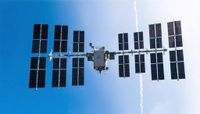A Cold Wind of Geopolitical Tension Sweeps Across Europe as the Continent Becomes Wary of Placing Its Strategic Communication Capabilities in the Hands of Elon Musk's Starlink. In the Complex Dance of Diplomacy and Security, Eva Berneke Finds Herself at a Crossroads. The Director of Eutelsat, a Low-Key Danish Engineer, is Under the Spotlight, Tasked with Providing a Viable Alternative to Starlink in Ukraine. Her Mission Could Redefine Europe's Digital Sovereignty.
As the Russian invasion continues, the lifeline that Starlink provides to Ukrainian forces is crucial, with its constellation of satellites enabling critical communications on the battlefield. However, the specter of dependency looms— not just due to reliance on American technology controlled by Musk, but also because of the unpredictable nature of the entrepreneur himself. Musk's assertive positioning and polarizing tweets only serve to amplify anxiety in European capitals.
At the heart of this complex narrative is Eutelsat's move to leverage OneWeb, its satellite network, as a formidable challenger. Although terminals are currently few in Ukraine, with ambitions to scale rapidly, Eutelsat could bolster Kyiv's resilience against future Starlink shortages. However, the obstacles are steep. OneWeb's satellites are bulkier and more expensive than their Starlink counterparts, necessitating significant investment and cooperation among Eutelsat's multinational stakeholders—including the French and British governments, alongside a major Indian backer.
This potential shift in satellite supremacy underscores a broader desire for European autonomy in space communications. The tumultuous approach of the Trump administration to alliances has already sown seeds of caution. As Europe navigates its strategic future, there is an emerging consensus: relying solely on a single mercurial American company is too great a risk.
The push for independence resonates beyond the continent's borders. Projects like Amazon's upcoming satellite initiative and China's vast network loom on the horizon, marking a new era of intense competition in space. In this emerging multipolar landscape, Berneke and Eutelsat find themselves at a critical juncture, propelled by Europe's aspiration to control its destiny among the stars.
Berneke's journey, from IT veteran to space industry leader, is emblematic of Europe's determination in this high-risk environment. Learning the harsh realities of satellite warfare when Russian cyberattacks crippled Eutelsat's systems, she understands the urgency of forging a reliable European alternative. The vision is clear: a robust and autonomous satellite network that keeps Europe connected, safeguarding its interests regardless of external whims.
The challenges are significant, but the prospect of a self-sufficient continent, sovereign in space technology, drives Eutelsat forward, defying convention and elevating Europe's hopes, one satellite launch at a time. Can Europe truly challenge Starlink's dominance in satellite communications?
In the evolving landscape of geopolitical technology, Europe faces a crucial decision in its strategic communication capabilities. With Elon Musk's Starlink proving essential for Ukrainian forces during the Russian invasion, Europe is reflecting on the risks of dependency on a single actor for critical infrastructure. Led by Eutelsat and its CEO Eva Berneke, the continent is exploring alternatives such as Eutelsat's OneWeb satellite network to achieve digital sovereignty and reduce dependence on American-controlled technology.
Understanding the stakes: why Europe's satellite independence is essential
1. Strategic autonomy: The fear of overreliance on Starlink goes beyond technological concerns. Musk's unpredictable decisions have fueled anxieties, prompting Europe to seek control over its communication infrastructure.
2. Economic considerations: Investing in self-sufficient networks could pave the way for new job opportunities and strengthen Europe's role in the global space industry. Eutelsat's efforts reflect broader industry trends, promoting regional economic growth.
Challenges Eutelsat must face
1. Technological and cost challenges: OneWeb's satellites are larger and more expensive than Starlink's, which could be a hurdle for rapid deployment and presents financial challenges for Eutelsat, especially with the need for substantial investment and international cooperation.
2. Geopolitical coordination: With key players including France, the UK, and India, aligning strategic objectives among multiple governments presents a complex diplomatic challenge requiring delicate negotiations and partnerships.
3. Competition: Upcoming projects from Amazon and China's expanding network introduce additional market pressures, making innovation and competitiveness essential for Europe's success in this domain.
Potential benefits of Eutelsat's strategy
1. Resilient communications: A robust European satellite network would ensure fewer interruptions in communication during geopolitical tensions or cyberattacks. This is crucial for national security and defense capabilities.
2. Technological leadership: Leadership in autonomous space technology could enhance Europe's global standing, attracting further partnerships and international collaborations.
Key considerations for Eutelsat stakeholders
- IT sustainability and security: Building a satellite fleet that is environmentally sustainable and resilient against cyber threats is paramount.
- Scalability and accessibility: Eutelsat must ensure that its technology not only scales effectively but is also accessible to various users, from governments to businesses.
Future forecasts and market trends
1. Increasing multipolar competition: As countries invest in their satellite capabilities, a multipolar space landscape may emerge, leading to greater competition and collaboration opportunities.
2. Growing demand for secure communication networks: With global events increasing reliance on secure communications, the demand for satellite technology will rise, encouraging innovation and cross-border technologies.
Practical recommendations
- Diversify partnerships: Leverage diverse partnerships to spread financial risks and enhance collaborative innovation.
- Support political backing: Collaborate with European politicians to secure support and funding for technological advancements.
- Focus on cybersecurity: Make cybersecurity a priority to prevent disruptions and build trust among stakeholders and users.
Europe finds itself at a critical crossroads in redefining its presence in the satellite communications sector. With strategic moves from players like Eutelsat, the continent could soon emerge as a formidable force in securing its technological independence. By embracing cooperation, innovation, and strategic investments, Europe can chart a path toward a sustainable and autonomous space future.






